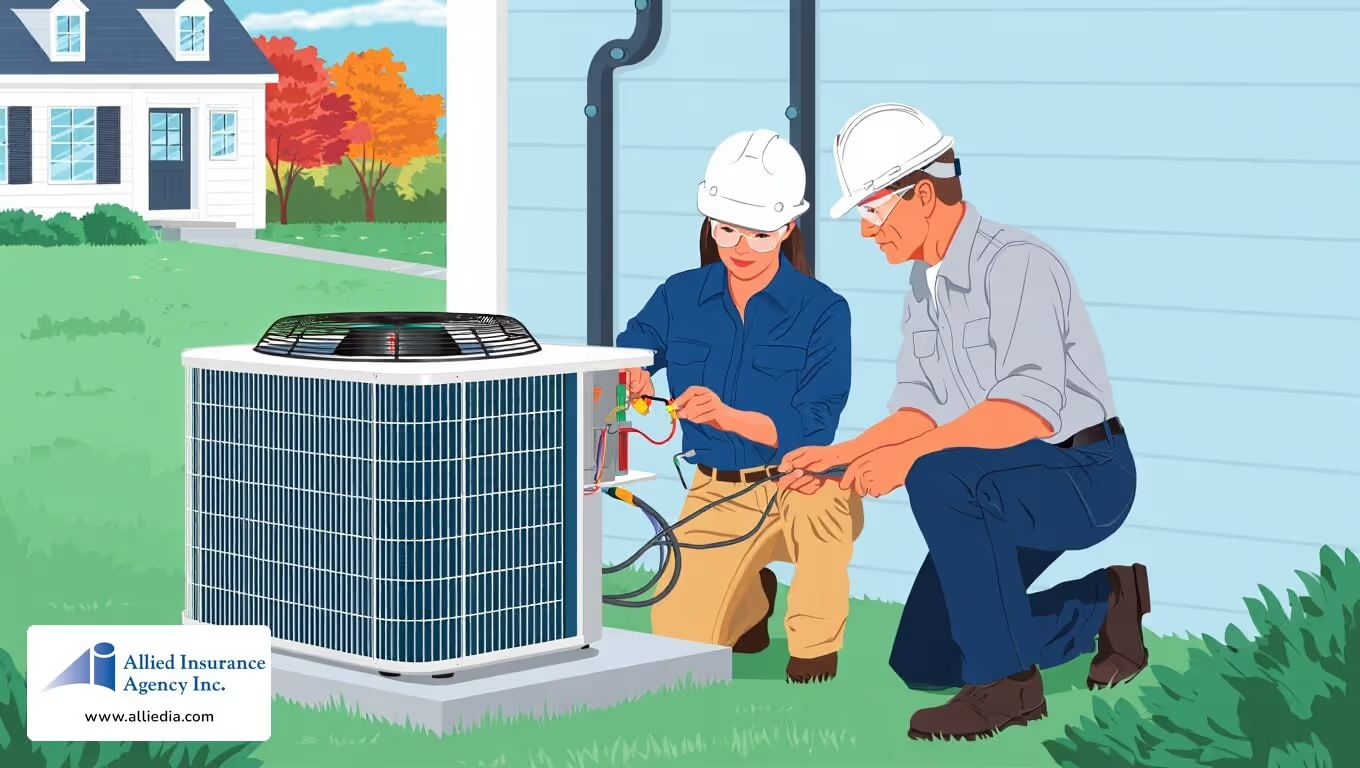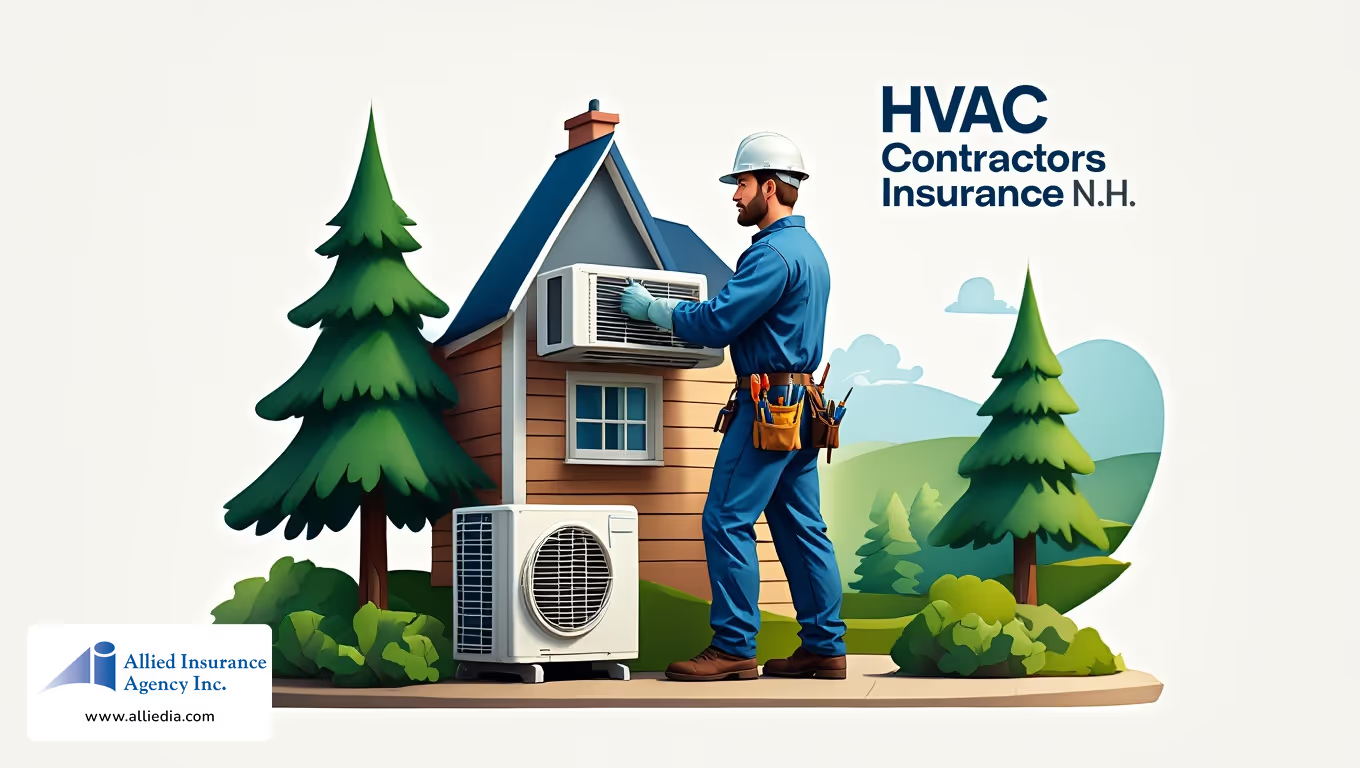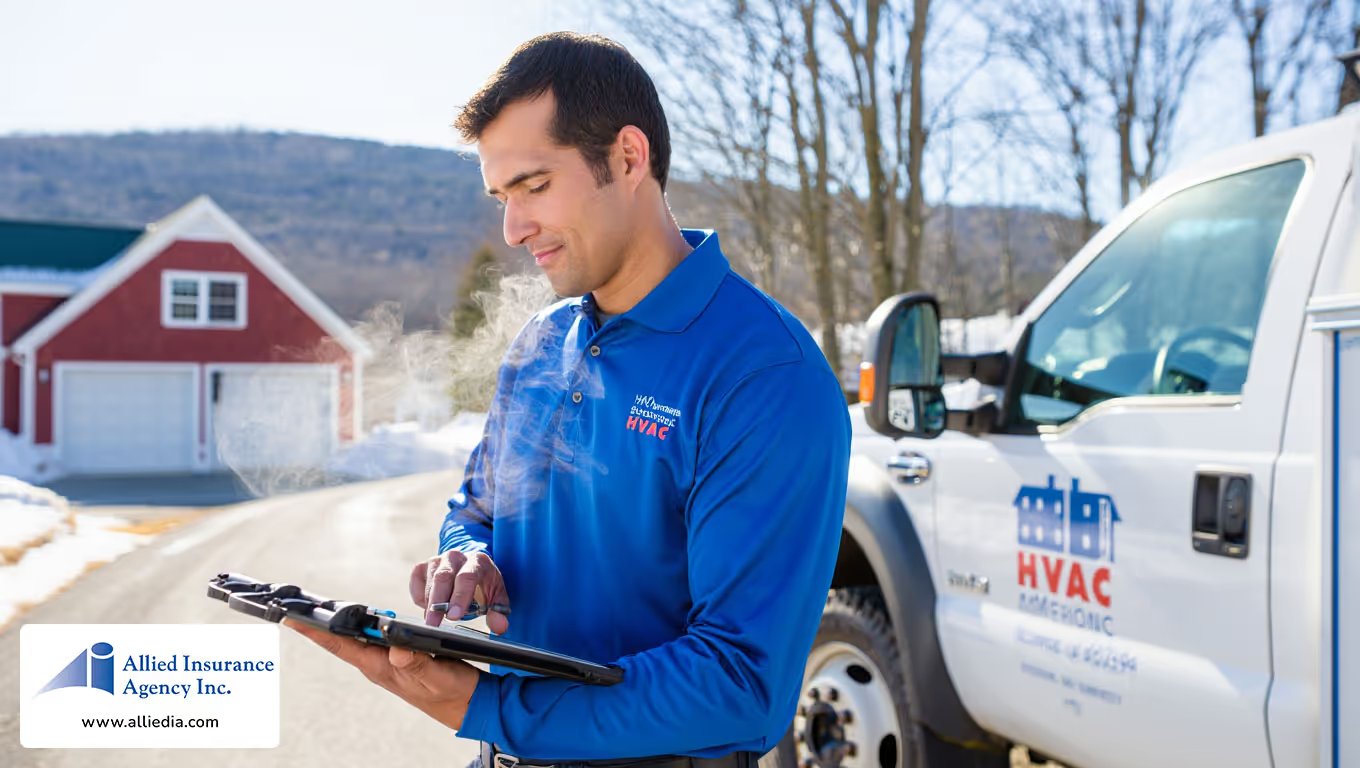
Why HVAC Contractors Without Insurance Are One Lawsuit Away from Losing It All
New Hampshire service teams face daily exposures that can sink a small company. A refrigerant leak at a Concord shop, a condensate overflow at a Bow home, or a slip on ice in Hooksett can produce costly third-party liability and property damage claims.
Coverage outcomes hinge on policy language and how an investigation establishes facts. Limits, endorsements, and state rules change what a policy will pay. Owners who rely on a single form for every exposure risk gaps.
This guide explains which protections a hvac contractor needs, from general liability and workers compensation to inland marine and commercial vehicle cover for service vans. It also shows how underwriting, client mix, and local codes shape pricing and eligibility.
Contact Allied Insurance Agency for a free N.H. artisan contractors insurance quote that aligns limits and endorsements with winter risks and municipal permit terms.
Key Takeaways
- Local incidents in Concord, Bow, and Hooksett show how quickly claims can threaten a business.
- Policy language and claim facts determine whether a loss gets paid.
- Right-sized limits and coordinated coverage beat piecemeal solutions.
- Underwriting, safety steps, and documentation improve eligibility and pricing.
- Allied Insurance Agency can provide a tailored N.H. quote for artisan operations.
What’s at stake for HVAC contractors in New Hampshire right now
One mistake on a busy day can turn routine service into an existential threat. In Concord, Bow, and Hooksett, heating and air conditioning demand spikes drive after-hours calls and rushed repairs. These moments increase exposure for small businesses that lack tailored protection.
Water from a misrouted condensate line can cause property damage and prompt third-party claims. Electrical arcing during a furnace swap can lead to injury allegations and costly downstream losses. Coverage decisions vary by state and hinge on policy terms and how an investigation establishes facts.
- Operational hazards: icy job sites, winter driving, and tight schedules raise the risk of injury and vehicle loss.
- Contract and client demands: municipalities often require proof of coverage, specific limits, and endorsements before work proceeds.
- Property and mobile exposures: tools, units in transit, and temporary storage create gaps that increase claim frequency and costs.
As an independent local agency, Allied frames practical steps—job hazard checklists, client communication scripts, and documentation practices—to protect reputation and keep a business working after a loss.
Understanding the essentials: HVAC insurance fundamentals for small and mid-sized shops
Understanding which coverages respond first makes the difference between a managed claim and a business crisis.
Why general liability and workers’ compensation are the foundation
General liability protects against third-party bodily injury and property damage that can occur during a service visit. Terms and limits should match typical project sizes in New Hampshire.
Workers compensation covers on-the-job injury, medical bills, and wage replacement for employees. It also reduces employer exposure to lawsuits after a work injury.
How commercial auto and property coverage protect rolling and fixed assets
Commercial auto keeps service vans and trucks covered for collisions and liability during work. A separate property policy protects the shop, stock, and fixed equipment at a Concord or Hooksett location.
- Coordinate policies: avoid overlaps and gaps so coverage follows crews and equipment from warehouse to jobsite.
- Underwriting matters: employees, training, and incident records affect availability and costs.
- Mobile tools: consider inland marine for recovery machines and specialty equipment.
Contact Allied Insurance Agency for a free N.H. artisan contractors insurance quote.

Core protections every HVAC business should consider
Smart risk transfer ensures one accident does not unravel months of hard work and local reputation. A focused portfolio addresses common jobsite exposures in Concord, Bow, and Hooksett.
General liability insurance: Third-party bodily injury and property damage
General liability responds when a customer or visitor alleges bodily injury or property damage.
- Trips over hoses, soldering mishaps, or wiring errors can trigger claims.
- Limits, completed operations, and additional-insured endorsements matter for municipal work.
Workers’ compensation: Employee injuries and medical bills
Workers compensation covers medical bills and wage replacement for on-the-job injuries.
Employer’s liability limits should be reviewed based on employee count and job mix.
Commercial auto insurance: Service vans, winter risks, and hired/non-owned exposure
Commercial auto protects owned vans and certain physical damage. Endorsements can cover hired and non-owned auto use.
- Pair auto with inland marine for tools and equipment carried in vehicles.
- Consider umbrella extensions to raise commercial auto and employer’s liability limits for large claims.
Practical steps: set fleet safety rules, MVR screening, and align deductibles to cash flow to manage costs and claims.
Beyond the basics: Inland marine coverage for tools, equipment, and materials in transit
When equipment leaves the warehouse, the risk profile changes. Commercial property usually covers items at the primary shop only. Inland marine extends protection to items in transit and at temporary job sites around Concord, Bow, and Hooksett.
Contractors with a mobile workforce should consider two tailored options that fill this gap.
Contractor’s tools and equipment insurance for theft, fire, and accidental damage
Tools such as vacuum pumps, recovery machines, benders, and testers move daily. A contractor’s tools policy follows those assets and responds to theft, accidental damage, or fire while on the road or at a jobsite.
Installation floater insurance for units and ductwork en route or awaiting install
An installation floater protects HVAC units, air handlers, ductwork, line sets, and thermostats while in transit, in temporary off-site storage, or during installation. It covers covered perils like vandalism, storm, and fire, subject to policy wording and underwriting.
- Scheduled limits and agreed valuation help for high-value gear.
- Loss control steps—serial numbers, photo inventories, and locked storage—reduce premiums and speed claims.
- Coordinate inland marine and installation floater coverage so tools and materials stay protected from shop to install.
Project-based safeguards that fill gaps
Project work introduces exposures that typical shop policies often do not cover. New builds and major retrofits move risk onto the site. That requires targeted protections so materials and staged units stay covered.
Builder’s risk for new construction and major retrofits
Builder’s risk protects the structure under construction and materials on site. It steps in where a standard property policy ends.
- Protects staged units on roofs and mechanical rooms during install.
- Clarifies who bears loss during transit, storage, and install for GC schedules.
- Aligns weatherproofing and temporary heat plans with policy terms for winter work.
Commercial umbrella to extend liability limits
A commercial umbrella boosts limits above general liability, commercial auto, and employer’s liability once primary policy limits are exhausted.
- Provides excess protection for severe claims on municipal or larger projects.
- Requires underlying policies to meet umbrella self-insured retentions and wording.
- Certificates and additional-insured endorsements should be prepared early for bids and permits.
The agency coordinates policy language across stakeholders so coverage responds predictably and avoids finger-pointing after a loss. Selecting retentions and verifying prerequisites are essential before mobilization.
Contact Allied Insurance Agency for a free N.H. artisan contractors insurance quote.
Licensing, bonds, and compliance considerations in New Hampshire
Before a crew pulls into a job driveway, a stack of permits, bonds, and certificates often determines whether work can start. New Hampshire requires many service firms to meet state and local licensure and bonding rules. Concord, Bow, and Hooksett may add permit and inspection steps that affect timing and cost.
State and municipal requirements
New Hampshire licensure commonly asks for exam results, documented experience, and proof of coverage. Local permits can demand additional evidence during peak seasons.
Proof, bonds, and contract deadlines
Many contracts require specific policies, minimum limits, and additional-insured endorsements. Surety bonds back performance and code compliance and help a contractor win public or commercial work.
- Maintain certificates: align renewals to project milestones to avoid stop-work orders.
- Keep safety plans: document refrigerant handling, brazing, and lockout/tagout procedures for inspections.
- Monitor municipal updates: local rule changes can add permit steps for lifts, staging, or traffic control.
An independent New Hampshire insurance agency tracks local checklists and helps the company match bonding, policy types, and limits to the scope of services bid. Regular compliance audits stop small gaps from becoming costly delays.
hvac contractors insurance costs and underwriting factors in N.H.
Premiums often reflect business choices as much as past losses. Underwriters assess payroll classes, revenue, and the split between residential service and commercial installs to set rates for a New Hampshire firm.
Vehicle count, driver MVRs, garaging locations, and use patterns drive commercial auto insurance costs. Winter driving and local traffic add measurable risk.
Claims history matters. Frequency and severity influence pricing and terms. Documented safety upgrades after a loss can reduce future surcharges.
Practical levers to control premium exposure
- Accurate payroll and job classifications limit audit surprises and align compensation with premiums.
- Regular equipment maintenance and dispersed storage lower property and inland marine exposure.
- Focused employee training in brazing, electrical safety, and refrigerant handling cuts incident risk.
- Plan fleet growth before renewals so an independent agency can pre-market options and compare terms.
- Choose deductible and auto insurance levels that balance cash flow with out-of-pocket risk.
An independent New Hampshire agency helps present a clear operations narrative to underwriters, avoids blanket assumptions, and seeks competitive pricing subject to individual underwriting and policy terms.
Claims, exclusions, and policy language: What contractors must know before a loss
The difference between a paid claim and a dispute often lies in endorsements, exclusions, and timely evidence. Understanding how an insurer reads a form helps a team act fast when a loss occurs.
Why coverage determinations depend on the policy and claim investigation
Coverage decisions rest on exact policy wording, endorsements, and the facts gathered in the claim file. State rules and underwriting can change how terms apply.
Common exclusions that surprise teams
- Faulty workmanship limits — many policies won’t pay to correct the contractor’s own defective work.
- Pollution or refrigerant release exclusions that narrow recovery for certain spills or leaks.
- Theft limits for tools unless items are secured or scheduled on a floater.
- Liability distinctions — employee injuries are typically handled by workers’ comp, not general liability insurance.
Practical steps: review contracts for additional insured and primary/noncontributory wording, document pre-loss condition with photos and serial logs, and give prompt notice to preserve rights. An independent agency can review policies and advise on gaps before a claim escalates.

Risk management to reduce claims and control premiums
Routine site checks and clear work protocols prevent small errors from becoming major losses. Field teams that follow consistent job hazard analyses and short tailgate talks spot roof edges, confined spaces, and energized equipment before work starts.
Jobsite safety, EPA handling, and subcontractor controls
EPA-compliant refrigerant handling reduces environmental risks and shows regulators that procedures exist if a release occurs.
- Use written subcontractor agreements, require certificates with matching limits, and include hold-harmless language.
- Keep tool logs, etched IDs, and locked storage to limit theft and project delays.
- Document ladder, rigging, and lockout/tagout plans to lower employee injuries and property damage.
Vehicle maintenance, driver screening, and winter driving protocols
Preventive fleet maintenance, winter tire choices, and regular MVR checks cut accident frequency during New Hampshire storms.
- Train drivers on backing, cargo securement, and accident response to strengthen auto insurance defenses.
- Photograph incidents and file prompt reports to speed claim handling and support a defensible narrative.
- Review operations annually so new services are reflected in underwriting and coverage.
Engaging an independent agency for on-site walkthroughs and carrier loss-control coordination often yields measurable improvements that stabilize premiums over time. For more on building the right program, see hvac business insurance.
Local insight: Serving New Hampshire HVAC contractors in Concord, Bow, Hooksett, and beyond
Local winters and narrow job sites change how risk shows up for service teams across Concord, Bow, and Hooksett.
Independent agency guidance tailored to local codes and weather risks
Allied Insurance Agency uses field knowledge to match policy wording to real operations. Inspectors, property managers, and municipal permit rules differ by town. The agency helps align certificates, endorsements, and limits to reduce stop-work risks.
Practical, site-focused advice covers parking and secure garaging, overnight tool protection, and documenting break-ins for claim support.
- Winter safety checklists: traction aids, warm-up protocols, rooftop snow precautions.
- Client templates: clear scope on thermostats, filters, and seasonal tune-ups to reduce disputes.
- Auto and liability strategies tuned to local driving hazards and common property manager clauses.
Relationships with local adjusters and inspectors speed approvals and limit downtime. Annual reviews keep policy limits aligned with rising equipment and code changes.
Contact Allied Insurance Agency for a free N.H. artisan contractors insurance quote.
How to build a right-sized policy portfolio for your HVAC business
Start with a clear map of people, vehicles, and gear to match protection to real risk.
Map exposures across crew roles, vans, premises, equipment, in-transit materials, and completed operations. This simple inventory shows which types of coverage a business actually needs and where gaps are likely to appear.
- Set liability limits to match project size and contract demands, and confirm additional insured and primary/noncontributory language.
- Align property and equipment values to replacement cost for tools and recovery machines to avoid underinsurance.
- Pair inland marine and installation floaters with core policies so coverage follows materials from warehouse to jobsite.
- Choose deductibles that balance upfront costs with cash flow and add an umbrella where larger municipal jobs increase exposure.
Standardize incident reporting and driver eligibility reviews. Build a seasonal service calendar to sync operations with coverage and to control long‑term costs. An independent New Hampshire agency can benchmark offerings and recommend right‑sized hvac insurance options as the business grows.

Why work with an independent New Hampshire insurance agency
Choosing an independent firm gives a company unbiased comparisons and tailored endorsements for real-world operations. Local expertise matters when winter weather, municipal permits, and seasonal demand shape risk.
Choice, advocacy, and year-round service from a local team
An independent New Hampshire agency reviews market options and aligns policies with how a business actually works across seasons.
- Unbiased guidance: compares forms and endorsements so an hvac company gets the right fit without one-size-fits-all gaps.
- Claims advocacy: local advisors help clients assemble documentation and navigate adjuster requests to protect cash flow.
- Year‑round support: fast certificate turnarounds, renewal strategy sessions, and mid-term updates when fleets or staffing change.
- Contract fluency: aligns policies and endorsements with regional contract language to reduce back-and-forth with property managers.
- Proactive reviews: spot compensation, fleet, and equipment trends that affect pricing and eligibility before renewals.
Availability and pricing remain subject to underwriting and policy documents govern coverage. A responsive local team keeps the customer informed and helps the business adapt as work shifts from residential service to larger projects.
Conclusion
Local weather, tight job sites, and busy schedules make risk management a daily priority for area service teams.
New Hampshire businesses need coordinated coverage that matches seasonal heating and air conditioning surges and winter driving risks. The right mix of liability, property, inland marine, auto, and project protections helps a company withstand claims and keep jobs on schedule.
Proactive steps—clear documentation, subcontractor controls, and fleet safety—reduce loss frequency and support better long‑term pricing. Independent, local guidance ensures policy terms align with how crews actually work and the projects they want to win.
Next step: align coverage with real risks, confirm limits and endorsements against contracts, and schedule a review with a knowledgeable agency to protect cash flow, staff, and reputation before the next busy season.



